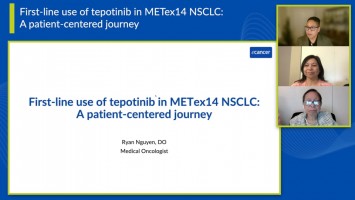I’m here to present data that are the results of clinical and pre-clinical studies conducted in Milan and globally in collaboration with centres throughout the world. In particular, in presenting data concerning the activity of a new molecule, a new compound, a new drug, that is entrectinib. Entrectinib was developed, was synthesised, in Italy years ago and it was synthesised as a drug capable of inhibiting kinases coded by fusion genes of oncogenes that are TRK, TRK1, 2, 3, and also ALK and ROS, and in particular fusion genes translocated on other promiscuous genes that are a variety of other genes.
What is important is that these genetic alterations that are fusion proteins and fusion translocations are oncogenic drivers of a variety of cancers of all histologies, including carcinomas, sarcomas and also neurological tumours. In particular at this meeting we will be presenting concerning GI, gastrointestinal, cancers and a series of patients comprising colorectal cancers, cholangiocarcinoma and pancreatic adenocarcinomas. In this series of patients, they are rare patients but still patients who can have benefit from this orally given drug that has a very, very limited spectrum of side effects. The benefit is sizeable because individual patients can have partial remission thanks to the drug that is lasting months after its administration.
In this series of GI gastrointestinal cancers we have not observed central nervous system dissemination or presence of CNS disease at the start of the treatment with entrectinib. Nevertheless, we know from data maturated from lung cancer that this is a very active drug also in the CNS, in the central nervous system. So we believe that clinical efficacy takes advantage also of the CNS penetration of this drug.
Overall we are very happy with these results because these results brought the therapeutic armamentarium for gastrointestinal cancers such as cholangiocarcinoma or pancreatic cancer and also colorectal cancer in which after failure with standard therapies the therapeutic armamentarium is very, very weak.
How was the toxicity profile?
Toxicites were limited to grade 2 and 3 toxicity and they were always reversible. There are very few grade 4 toxicity, they are mainly grade 4 biochemical toxicity without any clinical impact. Basically the patient does not really realise there is any toxicity. So the therapeutic index of entrectinib is very good.








